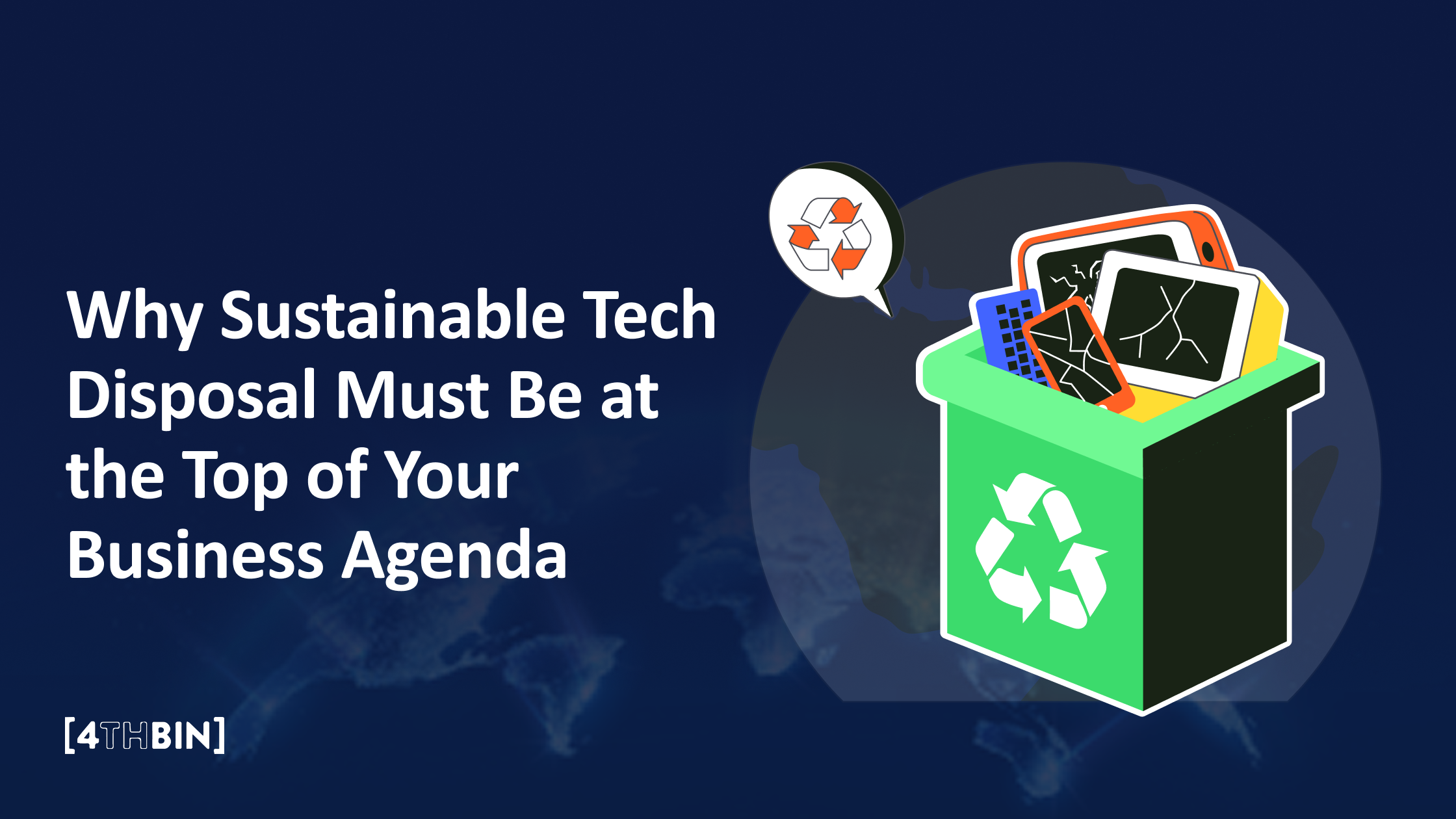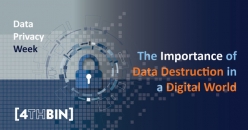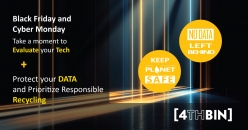HIPAA Compliant Destruction and Recycling of X-Ray Film
Every hospital visit leaves us with several medical documents, such as prescriptions, bills, reports, and X-rays. An estimated 3.6 billion diagnostic medical examinations, such as X-rays, are performed annually. Most of us hoard these medical documents, especially X-rays, anticipating their need for our future consultations.
Until one day, when you turn the house upside down to clean it and get rid of all the clutter, you decide to throw it out. Now, here’s the catch - did you know it is illegal to dispose of X-rays along with your general waste?
According to the Health Insurance Portability and Accountability Act (HIPAA), X-rays must undergo a unique disposal process as they contain protected health information (PHI). This blog will look at HIPAA requirements for X-ray disposal, how to dispose of X-ray films, the importance of HIPAA destruction, and considerations for recycling X-ray films.
What Are X-Ray Films Made Up Of?
Before we move on to its disposal, let us begin by understanding the composition of X-rays. X-rays are typically made of polyethylene terephthalate (PET) plastic and coated with an emulsion layer containing silver halide. When silver halide is exposed to heat, it turns black, capturing an image during the X-ray procedure. While most medical facilities have transitioned to digital imaging, physical X-ray films are still prevalent, making their destruction and recycling a cause of concern.
HIPAA Requirements for X-Ray Destruction
Before 2004, most X-rays were made of plastic and stored for longer periods due to record retention policies. Today, with the new record retention policy that mandates shorter retention periods, X-rays are eligible for destruction.
As mentioned above, X-ray films contain protected health information (PHI) that is either related to an individual’s health or may contain personal information about the individual. Due to this nature, HIPAA requires X-ray films to be destroyed so that they cannot be reconstructed.
Under HIPAA, healthcare facilities and providers are responsible for maintaining and properly disposing of X-ray films. As per federal law, these X-rays and medical records may be retained for at least 7 years for adults and 18 years for minors before their disposal.
However, these are subject to change based on local state laws and regulations. For example, healthcare providers in New York must keep X-rays and medical records for at least six years before destroying and disposing of them.
HIPAA offers healthcare facilities and providers the choice to perform on-site or off-site destruction, provided that it is done in a manner where the confidentiality of the information is intact.
If a facility proceeds to destroy its X-ray films on-site, it must ensure they are completely shredded and permanently destroyed. However, if a healthcare facility is outsourcing an X-ray recycling company, they must obtain a “Certificate of Destruction” stating and confirming the safe destruction of PHI.
The Importance of HIPAA Destruction & Recycling of X-Ray Films
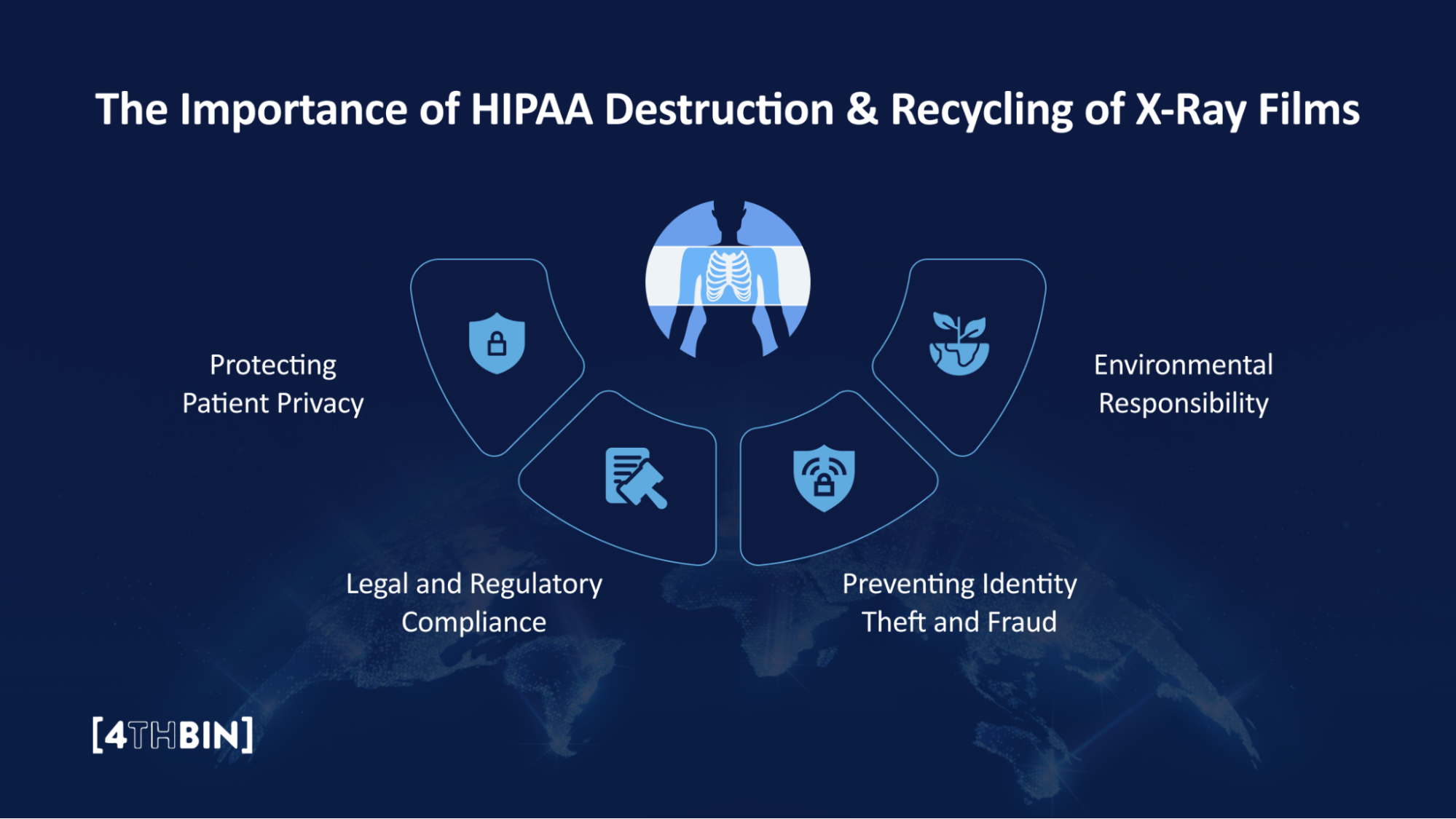
Here is why healthcare facilities and providers must destroy their X-ray films as per HIPAA guidelines:
Protecting Patient Privacy
When X-ray films are disposed of improperly, it can lead to unauthorized access and potential misuse of this information. HIPAA mandates that all PHI must be appropriately destroyed to prevent patient privacy breaches. By adhering to HIPAA guidelines, healthcare facilities can maintain patient confidentiality, enabling trust and security in their services.
Legal and Regulatory Compliance
Non-compliance with HIPAA regulations can result in significant legal and financial repercussions for healthcare providers. Penalties for HIPAA violations can range from hefty fines to criminal charges, depending on the severity of the breach. These fines can vary from $100 to $50,000 and go up to $250,000 for repeat violations.
Proper destruction of X-ray films is not just a best practice but a legal requirement to avoid these consequences. Moreover, healthcare providers adhering to HIPAA standards are committed to ethical practices and regulatory adherence, safeguarding their organizations from potential lawsuits and penalties.
Preventing Identity Theft and Fraud
With improper disposal of X-ray films, sensitive and personal information may fall into the wrong hands. Malicious actors can use the information on discarded films to create false medical records, commit insurance fraud, or steal identities. HIPAA-compliant destruction methods, such as shredding or incineration, render X-ray films unreadable and irrecoverable, protecting patients from the far-reaching impacts of identity theft and fraud.
Environmental Responsibility
Properly destroying X-ray films is an environmentally responsible practice in addition to protecting patient information. As mentioned, X-ray films contain silver, which can harm the environment if disposed of incorrectly. HIPAA-compliant destruction often includes recycling programs that safely extract and reuse these materials, reducing their environmental impact.
Moreover, recycling X-rays contributes to a circular economy by preventing plastic and valuable materials like silver from ending up in landfills and reducing the need for new raw materials. Extracting silver from X-rays can also yield a significant monetary profit of up to $35,000. Reintroducing these recovered materials into the production cycle supports sustainable resource management and minimizes environmental impact.
Steps for Responsible Recycling of X-Ray Film
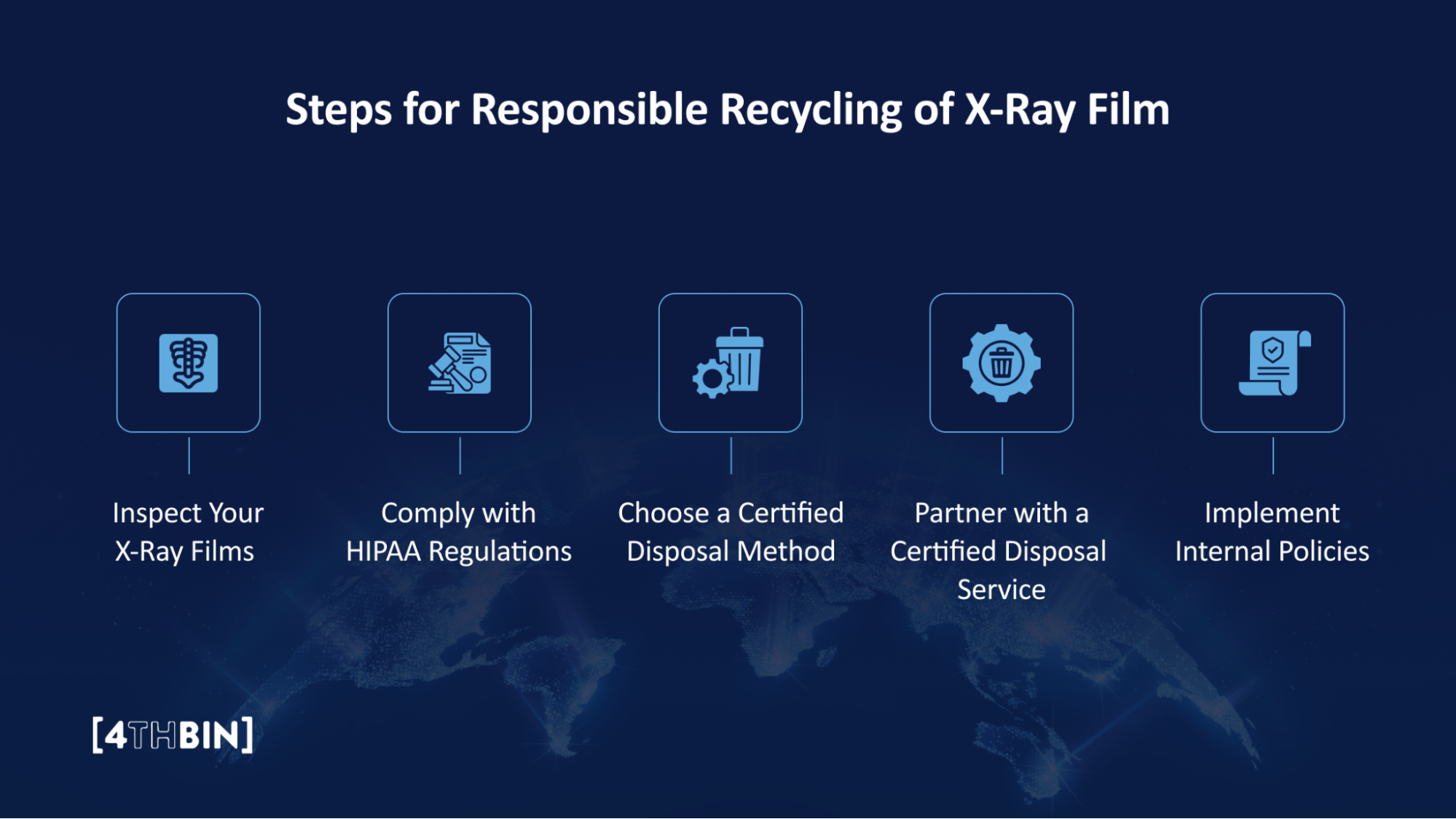
With proper disposal of X-ray films, healthcare facilities can protect patient information, avoid legal repercussions, and contribute to a greener environment. Here is a step-by-step process your facility can follow to ensure the proper recycling of X-ray films:
Inspect Your X-Ray Films
The first rule of X-ray recycling is to identify X-rays that are no longer needed. Your facility must begin by assessing all existing X-ray films. This involves determining which films are outdated, no longer required for patient care, or past their retention period. If they no longer serve a purpose, they must be disposed of.
Comply with HIPAA Regulations
The next step would be to ensure your facility adheres to HIPAA guidelines to protect patient information. You must begin by familiarizing yourself with HIPAA requirements for destroying PHI safely. If your facility opts for off-site X-ray destruction, you must store them in a secure location until they are ready to be disposed of, preventing unauthorized access.
Choose a Certified Disposal Method
Once you know HIPAA regulations, you must recycle them based on certified disposal and recycling methods that ensure the destruction of PHI and comply with legal and environmental standards. Here are a few methods to ensure the HIPAA-compliant destruction of X-ray films:
Shredding: X-ray films are shredded into small pieces, making it impossible to reconstruct any information.
Incineration: Films are burned in high-temperature incinerators, destroying the data and materials.
Chemical Destruction: Certain chemical processes can break down the film’s emulsion layer, erasing personal information.
Recycling: Specialized recycling programs extract valuable materials like silver while ensuring that all PHI is destroyed in the process.
Partner with a Certified Disposal Service
The most crucial step is to partner and work with a certified and reputable disposal service provider. Before choosing the right X-ray disposal service, you must verify their credentials and ensure they are equipped and certified to handle and destroy X-ray films according to HIPAA standards. Upon completion of safe destruction, you must also obtain a ‘certificate of destruction’ from the disposal service as proof that they have destroyed the X-ray films responsibly.
Implement Internal Policies
The last step is to develop and enforce internal policies within your facility regarding the disposal of X-ray films. These policies should establish clear guidelines for handling, storing, and disposing of X-ray films. You must also educate your staff on the importance of responsible disposal and the steps they must follow to ensure compliance.
By following these steps, healthcare providers ensure that X-ray films are disposed of responsibly and uphold the integrity and reputation of the healthcare facility.
Declutter & Safely Dispose of X-rays with 4THBIN!
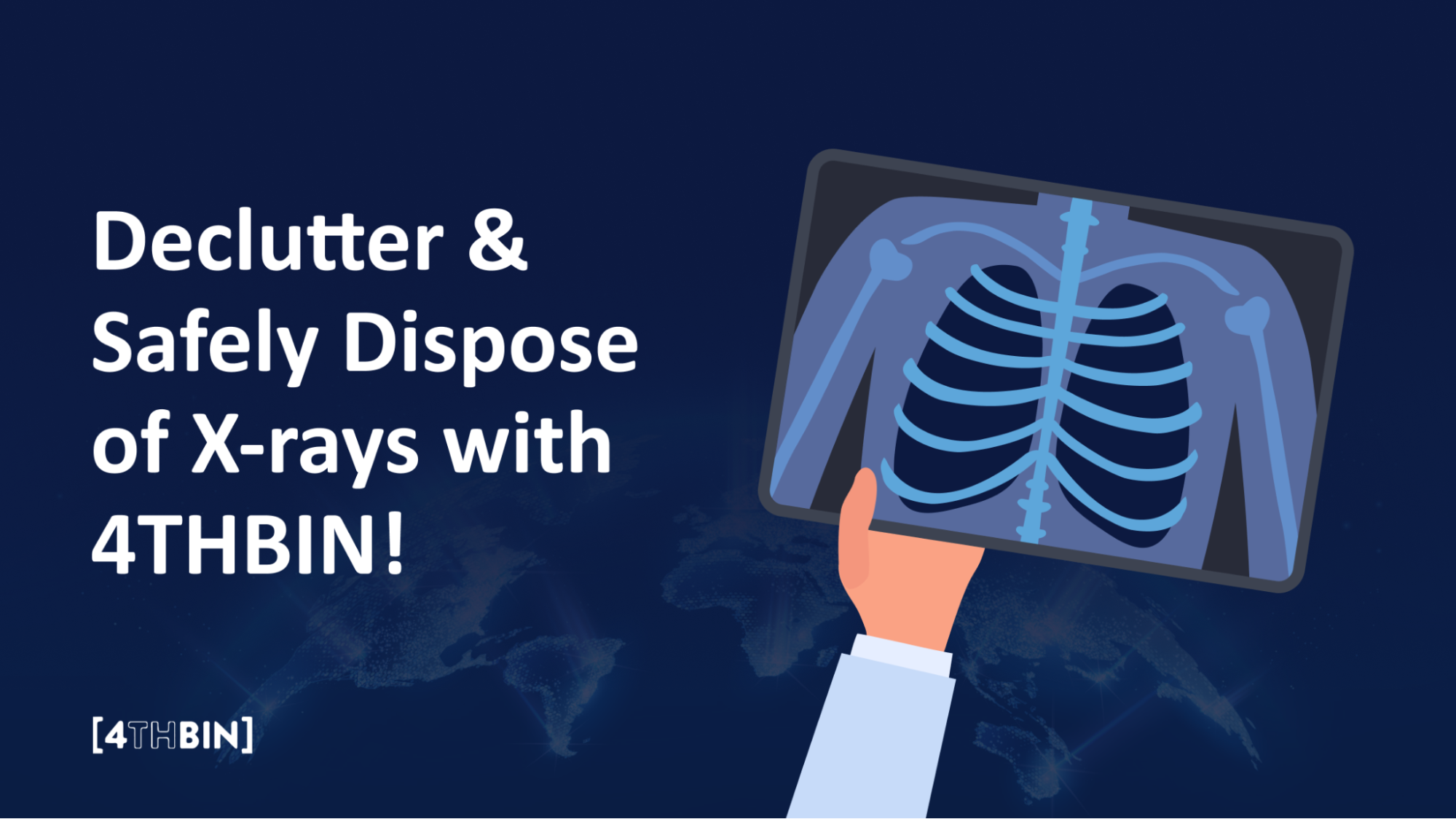
Is your organization struggling to recycle its X-rays? 4THBIN to the rescue! X-ray film is notoriously tricky to dispose of. Not only does it contain sensitive information, but it also holds silver, a valuable resource that shouldn’t go to waste.
With over a decade of experience, 4THBIN is a certified and secure e-recycling solution provider to over 10,000 businesses – from Fortune 100 companies to start-ups across the United States.
We believe that no data should be left behind! Backed by our data security expertise, we provide certified data destruction support to today’s top industries.
Our compliant destruction and recycling services ensure that X-ray films are securely destroyed and recycled responsibly, allowing you to rest easy knowing you’re doing right by your patients and the environment. We also help you deliver on your corporate social responsibility commitments by ensuring your medical and e-waste is securely and sustainably recycled.
Ensure Safe Disposal & Recycling of X-Rays!
Contact Us



